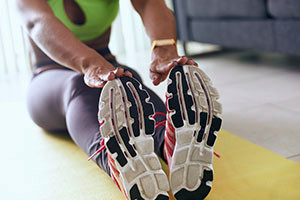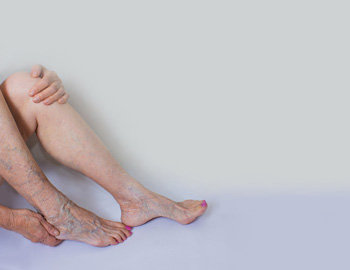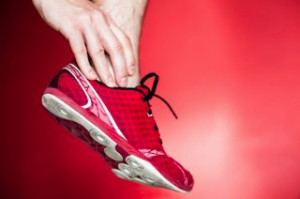March 2021
Why Does My Heel Hurt?
 The heel is a fatty cushion on the back of the foot that provides padding. Obesity, improperly fitting shoes, injuries and running and jumping on hard surfaces can all lead to heel pain issues. One of the most common causes of heel pain is plantar fasciitis. Plantar fasciitis occurs when the plantar fascia, the band of tissue along the bottom of the foot that connects the heel to the toes, becomes inflamed. Plantar fasciitis is often associated with a heel spur as well. When the plantar fascia tears near the heel, it can bleed and then calcify. These calcium deposits form heel spurs, which can only be detected through an X-ray. If you are struggling with heel pain, please consult with a podiatrist for a proper diagnosis and treatment.
The heel is a fatty cushion on the back of the foot that provides padding. Obesity, improperly fitting shoes, injuries and running and jumping on hard surfaces can all lead to heel pain issues. One of the most common causes of heel pain is plantar fasciitis. Plantar fasciitis occurs when the plantar fascia, the band of tissue along the bottom of the foot that connects the heel to the toes, becomes inflamed. Plantar fasciitis is often associated with a heel spur as well. When the plantar fascia tears near the heel, it can bleed and then calcify. These calcium deposits form heel spurs, which can only be detected through an X-ray. If you are struggling with heel pain, please consult with a podiatrist for a proper diagnosis and treatment.
Many people suffer from bouts of heel pain. For more information, contact one of our podiatrists of CyFair Family Foot Care. Our doctors can provide the care you need to keep you pain-free and on your feet.
Causes of Heel Pain
Heel pain is often associated with plantar fasciitis. The plantar fascia is a band of tissues that extends along the bottom of the foot. A rip or tear in this ligament can cause inflammation of the tissue.
Achilles tendonitis is another cause of heel pain. Inflammation of the Achilles tendon will cause pain from fractures and muscle tearing. Lack of flexibility is also another symptom.
Heel spurs are another cause of pain. When the tissues of the plantar fascia undergo a great deal of stress, it can lead to ligament separation from the heel bone, causing heel spurs.
Why Might Heel Pain Occur?
- Wearing ill-fitting shoes
- Wearing non-supportive shoes
- Weight change
- Excessive running
Treatments
Heel pain should be treated as soon as possible for immediate results. Keeping your feet in a stress-free environment will help. If you suffer from Achilles tendonitis or plantar fasciitis, applying ice will reduce the swelling. Stretching before an exercise like running will help the muscles. Using all these tips will help make heel pain a condition of the past.
If you have any questions please contact our office located in Cypress, TX . We offer the newest diagnostic and treatment technologies for all your foot and ankle needs.
Keeping Senior Feet Healthy
Throughout our lives, our feet support and carry the weight of our entire bodies. Therefore, it is no surprise that we may experience foot pain, or that foot problems can become increasingly more common as we age. Senior feet require special attention, as the feet are affected by years of wear and tear, and seniors are at an increased risk of developing other health conditions, such as diabetes or arthritis, which can affect the health of the feet. Seniors should regularly check their feet for any changes or abnormalities, including any cuts, scrapes, sores, or discoloration. If an irregularity is noticed, seeing a podiatrist as soon as possible is strongly suggested. A podiatrist can diagnose and treat the issue before it worsens and provide recommendations on how to avoid foot problems in the future.
Proper foot care is something many older adults forget to consider. If you have any concerns about your feet and ankles, contact one of our podiatrists from CyFair Family Foot Care. Our doctors can provide the care you need to keep you pain-free and on your feet.
The Elderly and Their Feet
As we age we start to notice many changes in our body, but the elder population may not notice them right away. Medical conditions may prevent the elderly to take notice of their foot health right away. Poor vision is a lead contributor to not taking action for the elderly.
Common Conditions
- Neuropathy – can reduce feeling in the feet and can hide many life-threatening medical conditions.
- Reduced flexibility – prevents the ability of proper toenail trimming, and foot cleaning. If left untreated, it may lead to further medical issues.
- Foot sores – amongst the older population can be serious before they are discovered. Some of the problematic conditions they may face are:
- Gouging toenails affecting nearby toe
- Shoes that don’t fit properly
- Pressure sores
- Loss of circulation in legs & feet
- Edema & swelling of feet and ankles
Susceptible Infections
Diabetes and poor circulation can cause general loss of sensitivity over the years, turning a simple cut into a serious issue.
If you have any questions please feel free to contact our office located in Cypress, TX . We offer the newest diagnostic and treatment technologies for all your foot and ankle needs.
Do Your Child's Feet Hurt?
The Three F’s of Buying Running Shoes
When it comes to buying any shoes, but particularly running shoes, the most important factors to consider are the three F’s: fit, feel, and function. You can find the right fit by having your foot professionally measured in a shoe store. Many people find that their shoe size changes throughout their lifetime, that their feet naturally swell throughout the day, and that one foot may be slightly larger than the other. By having your feet measured, you can find the correct shoe size that will accommodate your feet as they are now. Your running shoes should feel snug, but not tight. It is also helpful to know what type of running you will be doing and on which terrain, as some shoes are built specifically for certain types of running. For more information on how to find the right shoes for you, please consult with a podiatrist.
It is important to find shoes that fit you properly in order to avoid a variety of different foot problems. For more information about treatment, contact one of our podiatrists from CyFair Family Foot Care. Our doctors will treat your foot and ankle needs.
Proper Shoe Fitting
Shoes have many different functions. They cushion our body weight, protect our feet, and allow us to safely play sports. You should always make sure that the shoes you wear fit you properly in order to avoid injuries and deformities such as: bunions, corns, calluses, hammertoes, plantar fasciitis, stress fractures, and more. It is important to note that although a certain pair of shoes might be a great fit for someone else, that doesn’t mean they will be a great fit for you. This is why you should always try on shoes before buying them to make sure they are worth the investment. Typically, shoes need to be replaced ever six months to one year of regular use.
Tips for Proper Shoe Fitting
- Select a shoe that is shaped like your foot
- Don’t buy shoes that fit too tight, expecting them to stretch to fit
- Make sure there is enough space (3/8” to ½”) for your longest toe at the end of each shoe when you are standing up
- Walk in the shoes to make sure they fit and feel right
- Don’t select shoes by the size marked inside the shoe, but by how the shoe fits your foot
The shoes you buy should always feel as good as they look. Shoes that fit properly will last longer, feel better, and improve your way of life each day.
If you have any questions, please feel free to contact our office located in Cypress, TX . We offer the newest diagnostic and treatment technologies for all your foot care needs.
Who Is at Risk for Getting an Achilles Tendon Rupture?
 The large tendon on the back of the ankle connecting the calf muscle and the heel bone is known as the Achilles tendon. When this tendon tears, an Achilles tendon rupture may occur. A rupture is often common in sporting activities that involve pushing off the feet and sprinting, such as basketball and tennis. While Achilles tendon ruptures tend to happen more to males and people between the ages of 30 and 40, they can happen to anyone. Those who have poor flexibility, an inactive lifestyle, or are taking steroid medications may be at a higher risk for an Achilles tendon rupture as well. Signs of a rupture can include abrupt pain in the affected area, the feeling of getting kicked in the back of the leg, hearing a “pop” in back of the leg, weakness, and bruising or swelling in the area. If you believe that you have ruptured your Achilles tendon, or you would like to learn more about preventing a rupture, please consult with a podiatrist.
The large tendon on the back of the ankle connecting the calf muscle and the heel bone is known as the Achilles tendon. When this tendon tears, an Achilles tendon rupture may occur. A rupture is often common in sporting activities that involve pushing off the feet and sprinting, such as basketball and tennis. While Achilles tendon ruptures tend to happen more to males and people between the ages of 30 and 40, they can happen to anyone. Those who have poor flexibility, an inactive lifestyle, or are taking steroid medications may be at a higher risk for an Achilles tendon rupture as well. Signs of a rupture can include abrupt pain in the affected area, the feeling of getting kicked in the back of the leg, hearing a “pop” in back of the leg, weakness, and bruising or swelling in the area. If you believe that you have ruptured your Achilles tendon, or you would like to learn more about preventing a rupture, please consult with a podiatrist.
Achilles tendon injuries need immediate attention to avoid future complications. If you have any concerns, contact one of our podiatrists of CyFair Family Foot Care. Our doctors can provide the care you need to keep you pain-free and on your feet.
What Is the Achilles Tendon?
The Achilles tendon is a tendon that connects the lower leg muscles and calf to the heel of the foot. It is the strongest tendon in the human body and is essential for making movement possible. Because this tendon is such an integral part of the body, any injuries to it can create immense difficulties and should immediately be presented to a doctor.
What Are the Symptoms of an Achilles Tendon Injury?
There are various types of injuries that can affect the Achilles tendon. The two most common injuries are Achilles tendinitis and ruptures of the tendon.
Achilles Tendinitis Symptoms
- Inflammation
- Dull to severe pain
- Increased blood flow to the tendon
- Thickening of the tendon
Rupture Symptoms
- Extreme pain and swelling in the foot
- Total immobility
Treatment and Prevention
Achilles tendon injuries are diagnosed by a thorough physical evaluation, which can include an MRI. Treatment involves rest, physical therapy, and in some cases, surgery. However, various preventative measures can be taken to avoid these injuries, such as:
- Thorough stretching of the tendon before and after exercise
- Strengthening exercises like calf raises, squats, leg curls, leg extensions, leg raises, lunges, and leg presses
If you have any questions please feel free to contact our office located in Cypress, TX . We offer the newest diagnostic tools and technology to treat your foot and ankle needs.
Stretches Before and After Running
 Many people who enjoy the sport of running will gradually understand the importance of properly warming up and cooling down before and after a run, in addition to eating healthy foods. Research has shown that a strong body will endure less injuries, and this is achieved by performing simple stretches and exercises. These can include lunges, hip flexor stretches, and shin splints can possibly be avoided by practicing heel and toe walks. If you would like additional information about how running injuries can affect the feet, and how to prevent them, it is suggested that you seek the counsel of a podiatrist.
Many people who enjoy the sport of running will gradually understand the importance of properly warming up and cooling down before and after a run, in addition to eating healthy foods. Research has shown that a strong body will endure less injuries, and this is achieved by performing simple stretches and exercises. These can include lunges, hip flexor stretches, and shin splints can possibly be avoided by practicing heel and toe walks. If you would like additional information about how running injuries can affect the feet, and how to prevent them, it is suggested that you seek the counsel of a podiatrist.
Exercising your feet regularly with the proper foot wear is a great way to prevent injuries. If you have any concerns about your feet, contact one of our podiatrists of CyFair Family Foot Care. Our doctors will treat your foot and ankle needs.
How to Prevent Running Injuries
Many common running injuries are caused by overuse and overtraining. When the back of the kneecap starts wearing out and starts causing pain in your knee, this is commonly referred to as runner’s knee. Runner’s knee is a decrease in strength in your quadriceps and can occur if you’re not wearing properly fitted or supporting shoes. To prevent runner’s knee, focusing on hip strengthening is a good idea, as well as strengthening your quads to keep the kneecaps aligned.
What Are Some Causes of Running Injuries?
- One cause of a common running injury is called iliotibial band syndrome.
- Plantar fasciitis is also another common injury.
- Stress fractures can occur from overtraining, lack of calcium, or even your running style.
Best Ways to Prevent Running Injuries
- Wear footwear that fits properly and suits your running needs.
- Running shoes are the only protective gear that runners have to safeguard them from injury.
- Make a training schedule. Adding strengthening exercises as well as regular stretching can help keep you strong and limber and can lessen the possibility of injuries.
- Stretching keeps muscles limber; this will help you gain better flexibility.
If you have any questions please feel free to contact our office located in Cypress, TX . We offer the newest diagnostic and treatment technologies for all your foot and ankle needs.










